
higlabo
HigLabo library provide 1.AI client library(OpenAI, Anthoripic, Groq) 2.Object Mapper(fastest in the world) 3.DbSharp(DAL generator) 4.Other.(Mail, Ftp, Utility...etc)
Stars: 192
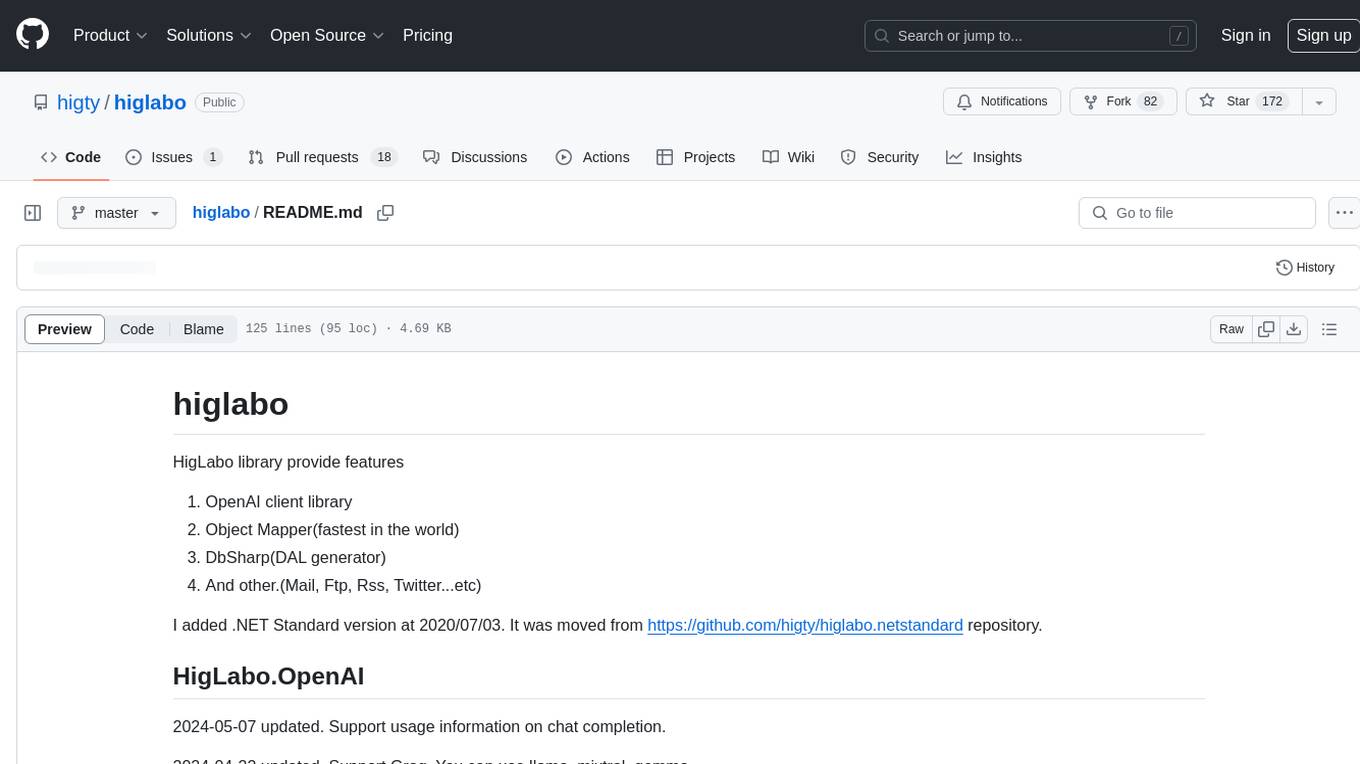
HigLabo is a versatile C# library that provides various features such as an OpenAI client library, the fastest object mapper, a DAL generator, and support for functionalities like Mail, FTP, RSS, and Twitter. The library includes modules like HigLabo.OpenAI for chat completion and Groq support, HigLabo.Anthropic for Anthropic Claude AI, HigLabo.Mapper for object mapping, DbSharp for stored procedure calls, HigLabo.Mime for MIME parsing, HigLabo.Mail for SMTP, POP3, and IMAP functionalities, and other utility modules like HigLabo.Data, HigLabo.Converter, and HigLabo.Net.Slack. HigLabo is designed to be easy to use and highly customizable, offering performance optimizations for tasks like object mapping and database access.
README:
HigLabo library provide features
- OpenAI client library
- Object Mapper(fastest in the world)
- DbSharp(DAL generator)
- And other.(Mail, Ftp, Rss, Twitter...etc)
I added .NET Standard version at 2020/07/03. It was moved from https://github.com/higty/higlabo.netstandard repository.
2025-03-14 Support Responses API endpoint, and web search, file search and more.
※Breaking change. The endpoint of ChatCompletions are all changed to ChatCompletionCreate. Please see latest sample code. https://github.com/higty/higlabo/blob/master/Net9/HigLabo.OpenAI.SampleConsoleApp/OpenAIPlayground.cs
2025-01-22 updated. Support .NET9.
2024-08-23 updated. Support administration api endpoint.
2024-06-05 updated. Support vector store chunking strategy.
2024-05-07 updated. Support usage information on chat completion.
2024-04-22 updated. Support Groq. You can use llama, mixtral, gemma
2024-04-20 updated. This release include fie search and vector store endpoint.
2024-04-17 updated. This release include Batch endpoint.
See article. https://www.codeproject.com/Articles/5372480/Csharp-OpenAI-library-that-support-Assistants-API
See sample code. https://github.com/higty/higlabo/blob/master/Net8/HigLabo.OpenAI.SampleConsoleApp/OpenAIPlayground.cs
Set up: HigLabo.OpenAI from Nuget, and also add HigLabo.Core, HigLabo.NewtonsoftJson. I test against latest version of these three packages.
How to use? It is easy to use!
var cl = new OpenAIClient("API Key");
var p = new ResponseCreateParameter();
p.Model = "gpt-4o";
p.Input.AddUserMessage($"How to enjoy coffee near by Shibuya? Please search shop list from web.");
p.Tools = [];
p.Tools.Add(new ToolObject("web_search_preview"));
var result = new ResponseStreamResult();
await foreach (string text in cl.ResponseCreateStreamAsync(p, result, CancellationToken.None))
{
Console.Write(text);
}
foreach (var item in result.ContentList)
{
if (item.Annotations != null)
{
foreach (var annotation in item.Annotations)
{
Console.WriteLine(annotation.Title);
Console.WriteLine(annotation.Url);
}
}
}
var cl = new OpenAIClient("API Key"); // OpenAI
--var cl = new OpenAIClient(new AzureSettings("API KEY", "https://tinybetter-work-for-our-future.openai.azure.com/", "MyDeploymentName"));
--var cl = new OpenAIClient(new GroqSettings("API Key")); // Groq, llama, mixtral, gemma
var result = new ChatCompletionStreamResult();
await foreach (string text in cl.ChatCompletionCreateStreamAsync("How to enjoy coffee?", "gpt-4", result, CancellationToken.None))
{
Console.Write(text);
}
Console.WriteLine();
Console.WriteLine("***********************");
Console.WriteLine("Finish reason: " + result.GetFinishReason());
var p = new RunCreateParameter();
p.Assistant_Id = assistantId;
p.Thread_Id = threadId;
var result = new AssistantMessageStreamResult();
await foreach (string text in cl.RunCreateStreamAsync(p, result, CancellationToken.None))
{
Console.Write(text);
}
Console.WriteLine();
// You can get each server sent event data by these property.
Console.WriteLine(JsonConvert.SerializeObject(result.Thread));
Console.WriteLine(JsonConvert.SerializeObject(result.Run));
Console.WriteLine(JsonConvert.SerializeObject(result.RunStep));
Console.WriteLine(JsonConvert.SerializeObject(result.Message));
2025-03-17 Support Imagen model image generation. You can generate image by imagen model.
2025-03-15 Support Gemini2.0 Flash experimental model. You can generate image from code.
2025-01-22 updated. Support .NET9.
var cl = new GoogleAIClient("API KEY");
var p = new ModelsGenerateContentParameter();
p.Model = ModelNames.Gemini_2_0_Flash_Exp;
p.AddUserMessage("Hi, can you create a 3d rendered image of a cat with wings and a top hat flying over a happy futuristic scificity with lots of greenery?");
p.GenerationConfig = new();
p.GenerationConfig.ResponseModalities = ["Text", "Image"];
p.Stream = false;
var res = await cl.GenerateContentAsync(p);
foreach (var candidate in res.Candidates)
{
foreach (var part in candidate.Content.Parts)
{
if (part.Text != null)
{
Console.WriteLine(part.Text);
}
if (part.InlineData != null)
{
using (var stream = part.InlineData.GetStream())
{
using (var bitmap = new Bitmap(stream))
{
string outputPath = Path.Combine(Environment.CurrentDirectory, "Image", $"GeneratedImage_{DateTimeOffset.Now.ToString("yyyyMMdd_HHmmss")}.jpg");
bitmap.Save(outputPath, System.Drawing.Imaging.ImageFormat.Jpeg);
}
}
}
}
}
HigLabo.Anthropic is a C# library of Anthropic Claude AI. 2014-04-07 updated. It support tool feature.
You can use it like this. Really easy and intuitive.
var cl = new AhtnropicClient("API KEY");
var result = new MessagesStreamResult();
await foreach (string text in cl.MessagesStreamAsync("How to enjoy coffee?", ModelNames.Claude3Opus, result, CancellationToken.None))
{
Console.Write(text);
}
if (result.MessageDelta != null)
{
Console.WriteLine("StopReason: " + result.MessageDelta.Delta.Stop_Reason);
Console.WriteLine("Usage: " + result.MessageDelta.Usage.Output_Tokens);
}
A mapper library like AutoMapper,EmitMapper,FastMapper,ExpressMapper..etc. I posted article to CodeProject. https://www.codeproject.com/Articles/5275388/HigLabo-Mapper-Creating-Fastest-Object-Mapper-in-t
You can map object out of box without configuration. You can also customize completely as you can with AddPostAction,ReplaceMap method.
I completely rewrite HigLabo.Mapper. Now, HigLabo.Mapper is fastest mapper library in the world.
Performance test at 2024/02/02.
Note) Mapperly is fast because it does not create new instance. That only pass reference. It does not map property values. Mapperly looks fastest but it is not on the test Address, Customer.
HigLabo.Mapper is fastest than any other library. Only Address to AddressDTO is slower than Mapperly.
HigLabo.Mapper (version3.0.0 or later) is used expression tree. It generate il code on runtime, so it is nealy fast as handy code.
2025-02-04 Refine DbSharpApplication.
A code generator to call stored procedure on database(SQL server, MySQL)
Article https://www.codeproject.com/Articles/776811/DbSharp-DAL-Generator-Tool-on-NET-Core
Download link for DbSharpApplication (version: 9.1.0.0) https://static.tinybetter.com/higlabo/DbSharpApplication/DbSharpApplication_9_1_0_0.zip
RazorRenderer class get html from .cshtml file.
You can use it by
var builder = WebApplication.CreateBuilder(args);
var services = builder.Services;
services.AddHttpContextAccessor();
services.AddScoped<RazorRenderer>();
var app = builder.Build();
app.MapGet("/portal", (RazorRenderer renderer) => await context.WriteHtmlAsync("/Pages/Portal.cshtml"));
app.MapGet("/task/list", (RazorRenderer renderer) => await context.WriteHtmlAsync("/Pages/TaskList.cshtml", new TaskListModel()));A library of Mime parser. Fastest parser in the world for MIME format. It is used for HigLabo.Mail.
A mail library of SMTP,POP3,IMAP.
https://www.codeproject.com/Articles/399207/Understanding-the-Insides-of-the-SMTP-Mail-Protoco https://www.codeproject.com/Articles/404066/Understanding-the-insides-of-the-POP-mail-protoco https://www.codeproject.com/Articles/411018/Understanding-the-insides-of-the-IMAP-mail-protoco
A library for database access.
Converter library for Base64,QueryString,QuotedPrintable,Rfc2047,ModifiedUtf7,ISO8601...etc.
Slack client library to call Slack API. https://www.codeproject.com/Articles/5336184/Creating-best-Csharp-Slack-client-library-in-the-w
Bing client library to call Bing search API.
For Tasks:
Click tags to check more tools for each tasksFor Jobs:
Alternative AI tools for higlabo
Similar Open Source Tools

higlabo
HigLabo is a versatile C# library that provides various features such as an OpenAI client library, the fastest object mapper, a DAL generator, and support for functionalities like Mail, FTP, RSS, and Twitter. The library includes modules like HigLabo.OpenAI for chat completion and Groq support, HigLabo.Anthropic for Anthropic Claude AI, HigLabo.Mapper for object mapping, DbSharp for stored procedure calls, HigLabo.Mime for MIME parsing, HigLabo.Mail for SMTP, POP3, and IMAP functionalities, and other utility modules like HigLabo.Data, HigLabo.Converter, and HigLabo.Net.Slack. HigLabo is designed to be easy to use and highly customizable, offering performance optimizations for tasks like object mapping and database access.
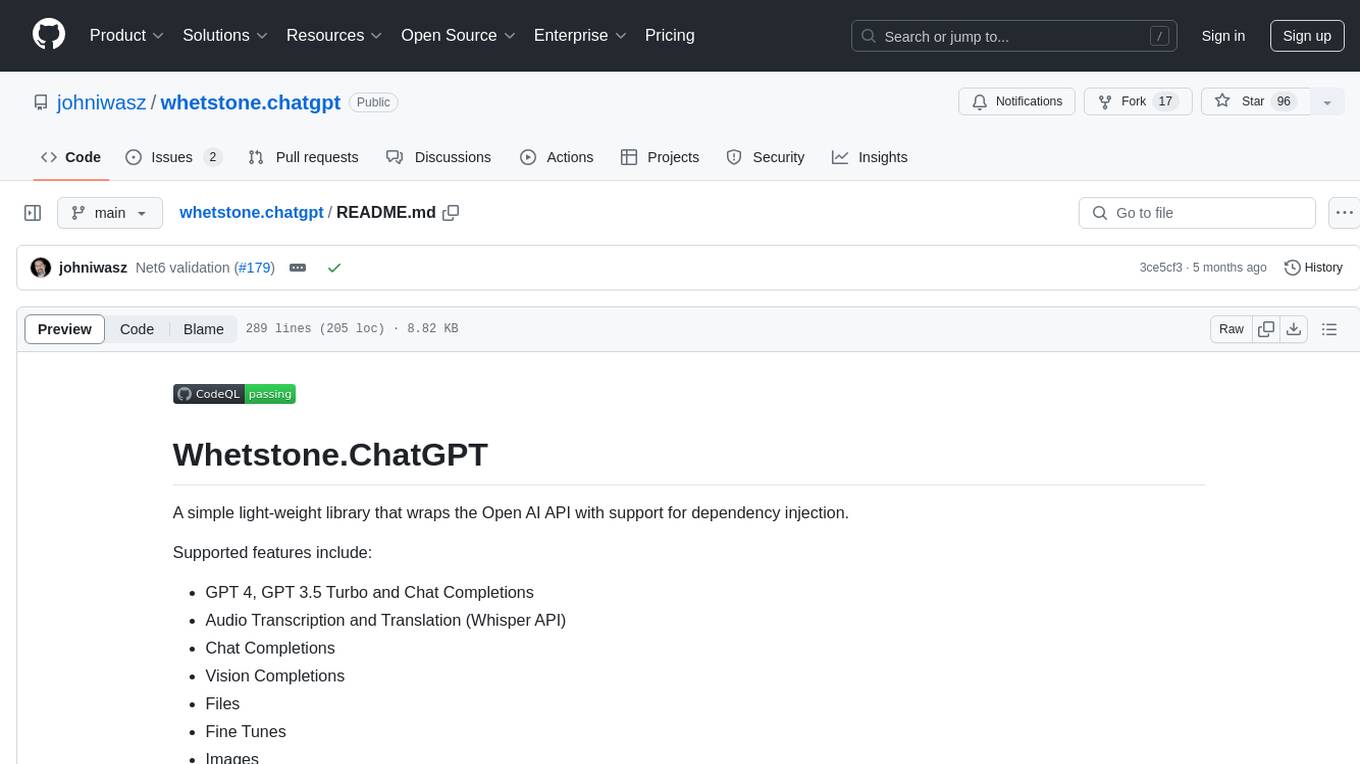
whetstone.chatgpt
Whetstone.ChatGPT is a simple light-weight library that wraps the Open AI API with support for dependency injection. It supports features like GPT 4, GPT 3.5 Turbo, chat completions, audio transcription and translation, vision completions, files, fine tunes, images, embeddings, moderations, and response streaming. The library provides a video walkthrough of a Blazor web app built on it and includes examples such as a command line bot. It offers quickstarts for dependency injection, chat completions, completions, file handling, fine tuning, image generation, and audio transcription.
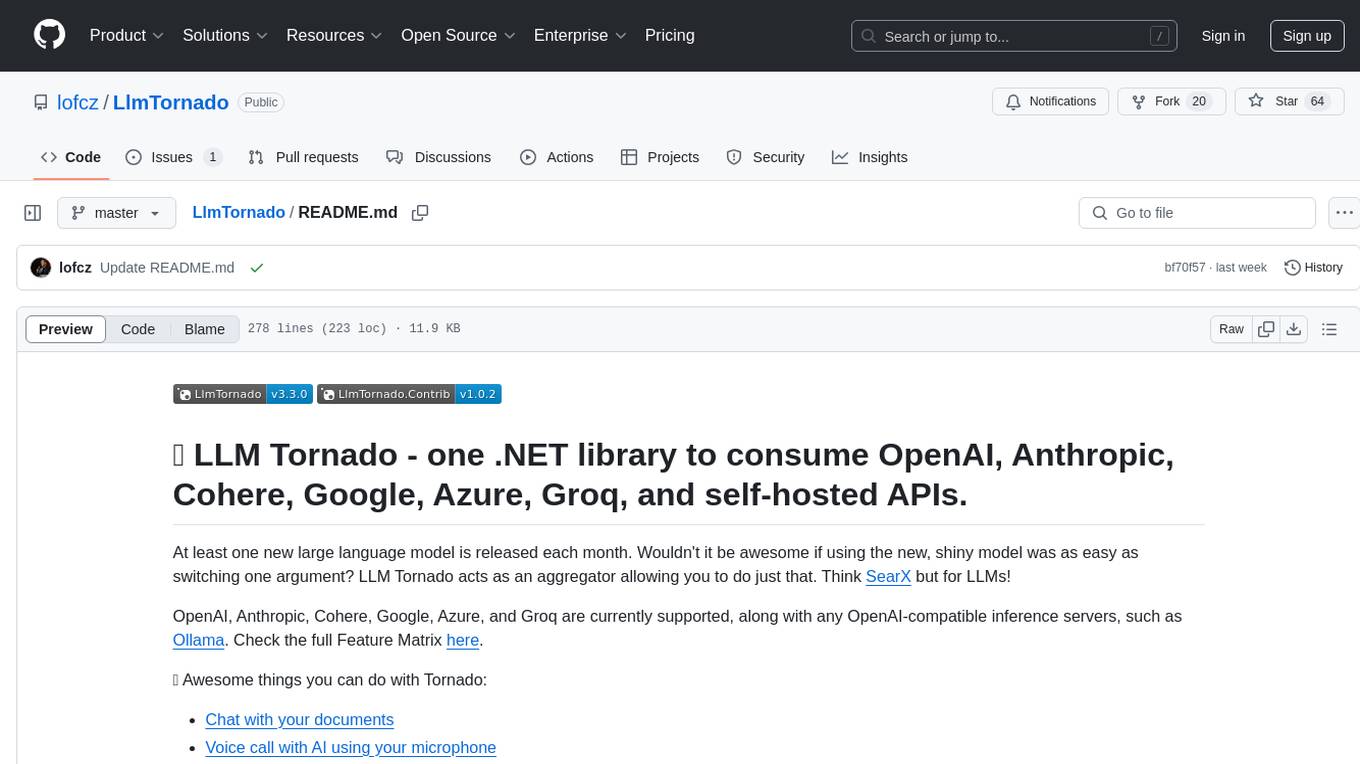
LlmTornado
LLM Tornado is a .NET library designed to simplify the consumption of various large language models (LLMs) from providers like OpenAI, Anthropic, Cohere, Google, Azure, Groq, and self-hosted APIs. It acts as an aggregator, allowing users to easily switch between different LLM providers with just a change in argument. Users can perform tasks such as chatting with documents, voice calling with AI, orchestrating assistants, generating images, and more. The library exposes capabilities through vendor extensions, making it easy to integrate and use multiple LLM providers simultaneously.
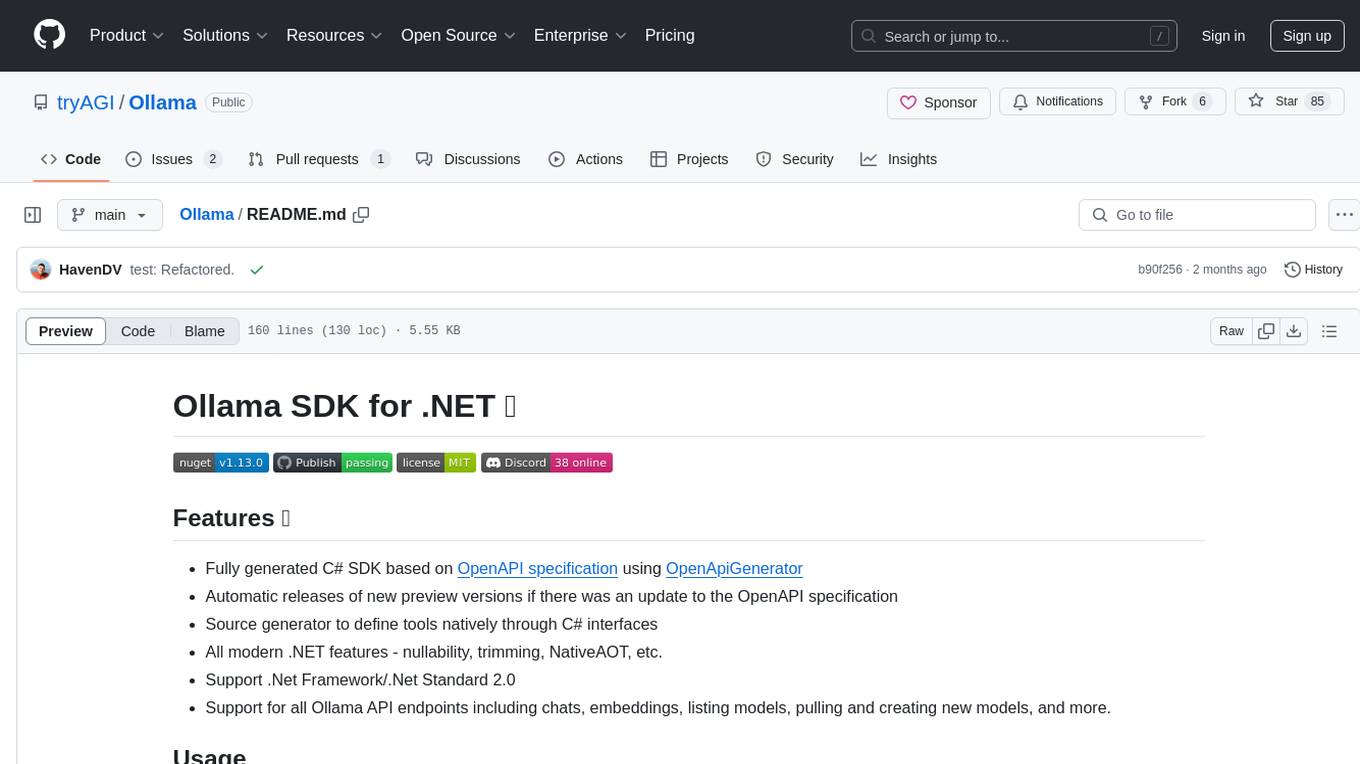
Ollama
Ollama SDK for .NET is a fully generated C# SDK based on OpenAPI specification using OpenApiGenerator. It supports automatic releases of new preview versions, source generator for defining tools natively through C# interfaces, and all modern .NET features. The SDK provides support for all Ollama API endpoints including chats, embeddings, listing models, pulling and creating new models, and more. It also offers tools for interacting with weather data and providing weather-related information to users.
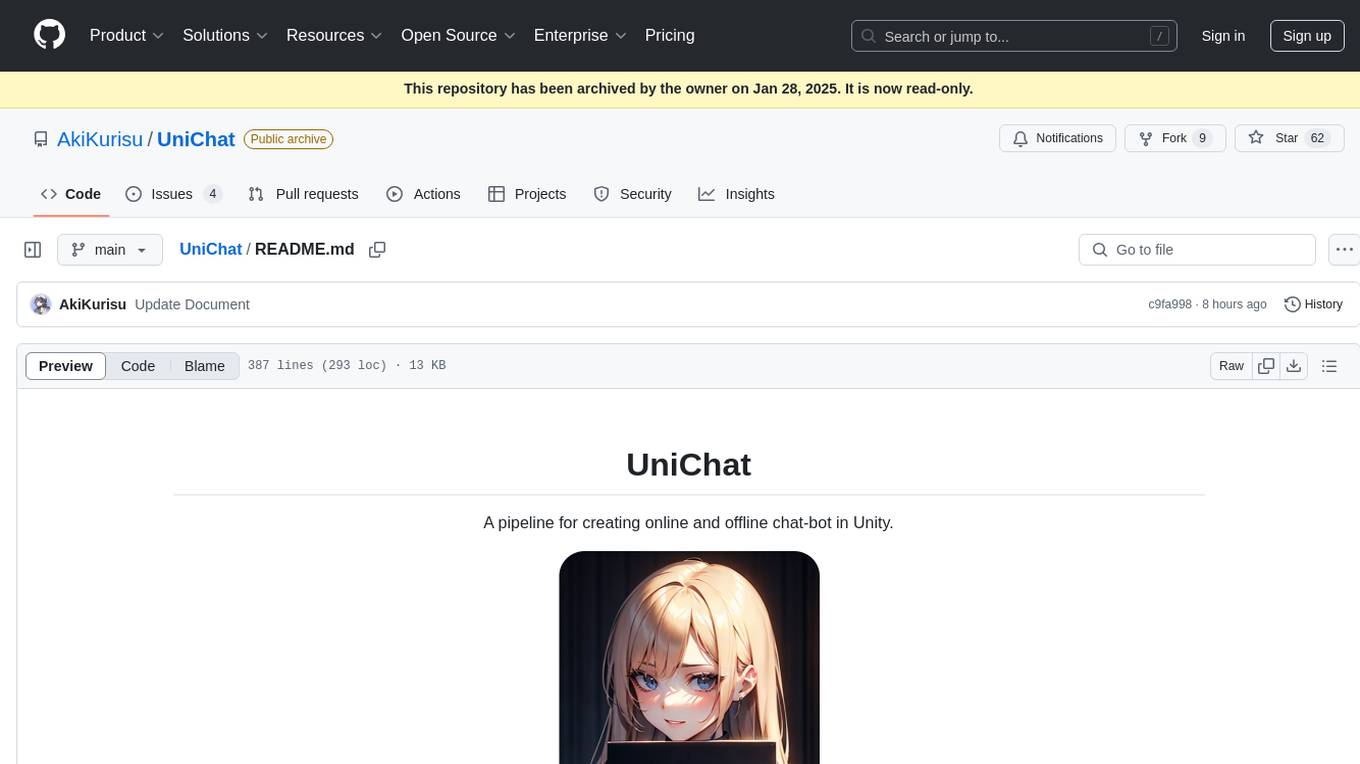
UniChat
UniChat is a pipeline tool for creating online and offline chat-bots in Unity. It leverages Unity.Sentis and text vector embedding technology to enable offline mode text content search based on vector databases. The tool includes a chain toolkit for embedding LLM and Agent in games, along with middleware components for Text to Speech, Speech to Text, and Sub-classifier functionalities. UniChat also offers a tool for invoking tools based on ReActAgent workflow, allowing users to create personalized chat scenarios and character cards. The tool provides a comprehensive solution for designing flexible conversations in games while maintaining developer's ideas.
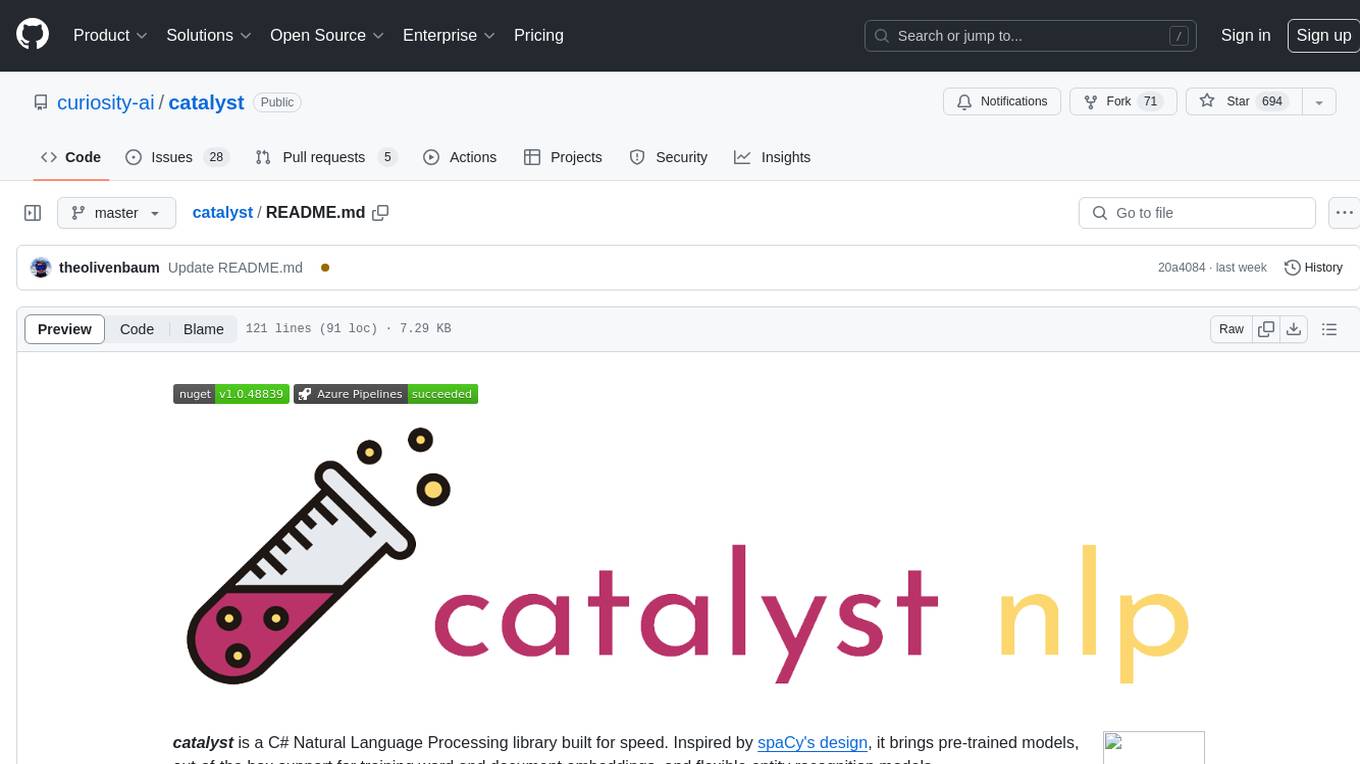
catalyst
Catalyst is a C# Natural Language Processing library designed for speed, inspired by spaCy's design. It provides pre-trained models, support for training word and document embeddings, and flexible entity recognition models. The library is fast, modern, and pure-C#, supporting .NET standard 2.0. It is cross-platform, running on Windows, Linux, macOS, and ARM. Catalyst offers non-destructive tokenization, named entity recognition, part-of-speech tagging, language detection, and efficient binary serialization. It includes pre-built models for language packages and lemmatization. Users can store and load models using streams. Getting started with Catalyst involves installing its NuGet Package and setting the storage to use the online repository. The library supports lazy loading of models from disk or online. Users can take advantage of C# lazy evaluation and native multi-threading support to process documents in parallel. Training a new FastText word2vec embedding model is straightforward, and Catalyst also provides algorithms for fast embedding search and dimensionality reduction.
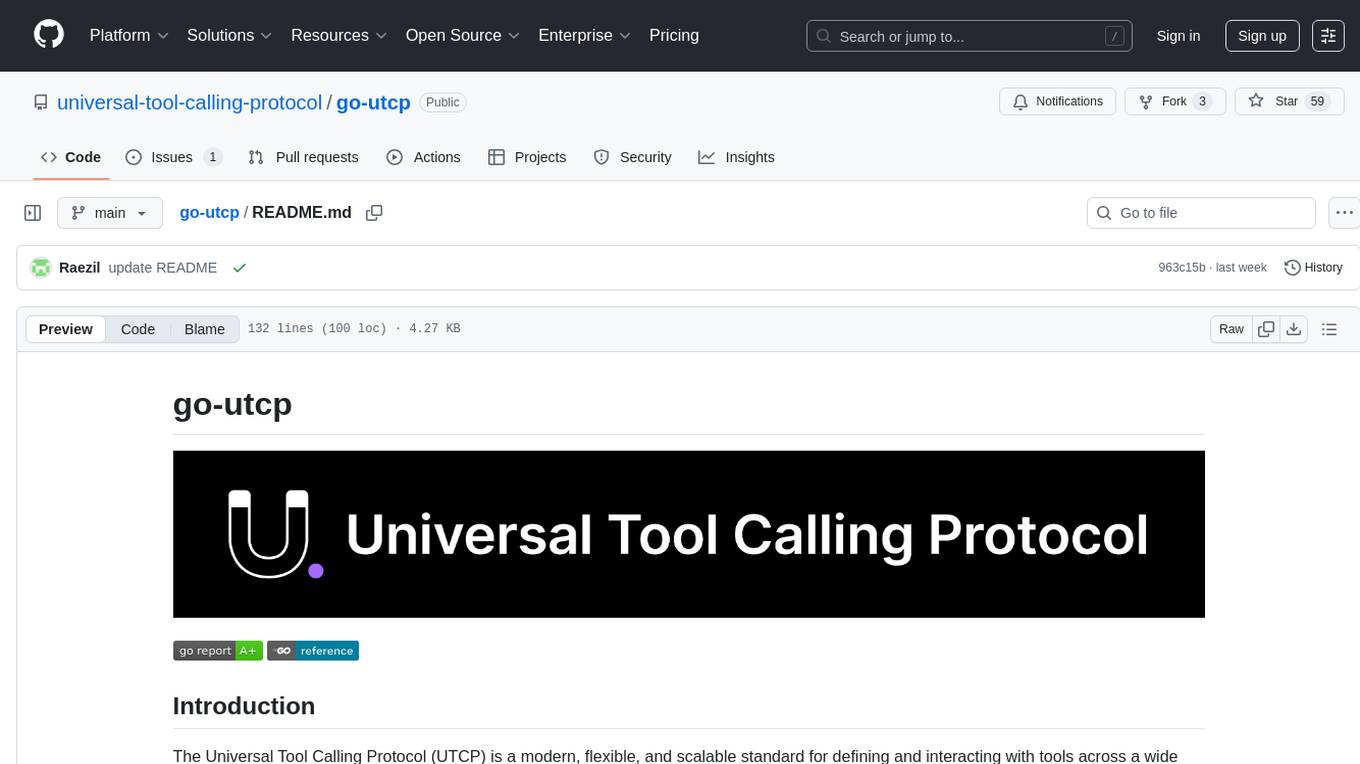
go-utcp
The Universal Tool Calling Protocol (UTCP) is a modern, flexible, and scalable standard for defining and interacting with tools across various communication protocols. It emphasizes scalability, interoperability, and ease of use. It provides built-in transports for HTTP, CLI, Server-Sent Events, streaming HTTP, GraphQL, MCP, and UDP. Users can use the library to construct a client and call tools using the available transports. The library also includes utilities for variable substitution, in-memory repository for storing providers and tools, and OpenAPI conversion to UTCP manuals.
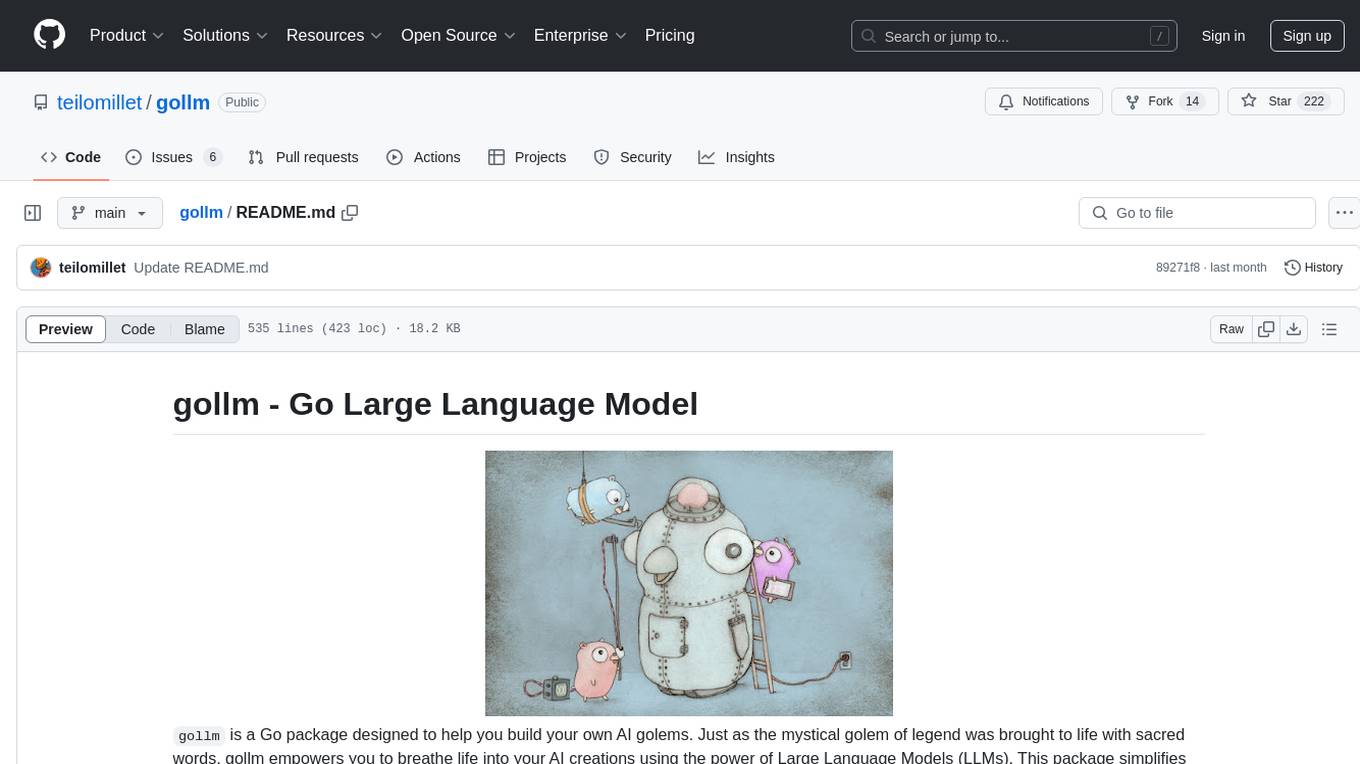
gollm
gollm is a Go package designed to simplify interactions with Large Language Models (LLMs) for AI engineers and developers. It offers a unified API for multiple LLM providers, easy provider and model switching, flexible configuration options, advanced prompt engineering, prompt optimization, memory retention, structured output and validation, provider comparison tools, high-level AI functions, robust error handling and retries, and extensible architecture. The package enables users to create AI-powered golems for tasks like content creation workflows, complex reasoning tasks, structured data generation, model performance analysis, prompt optimization, and creating a mixture of agents.
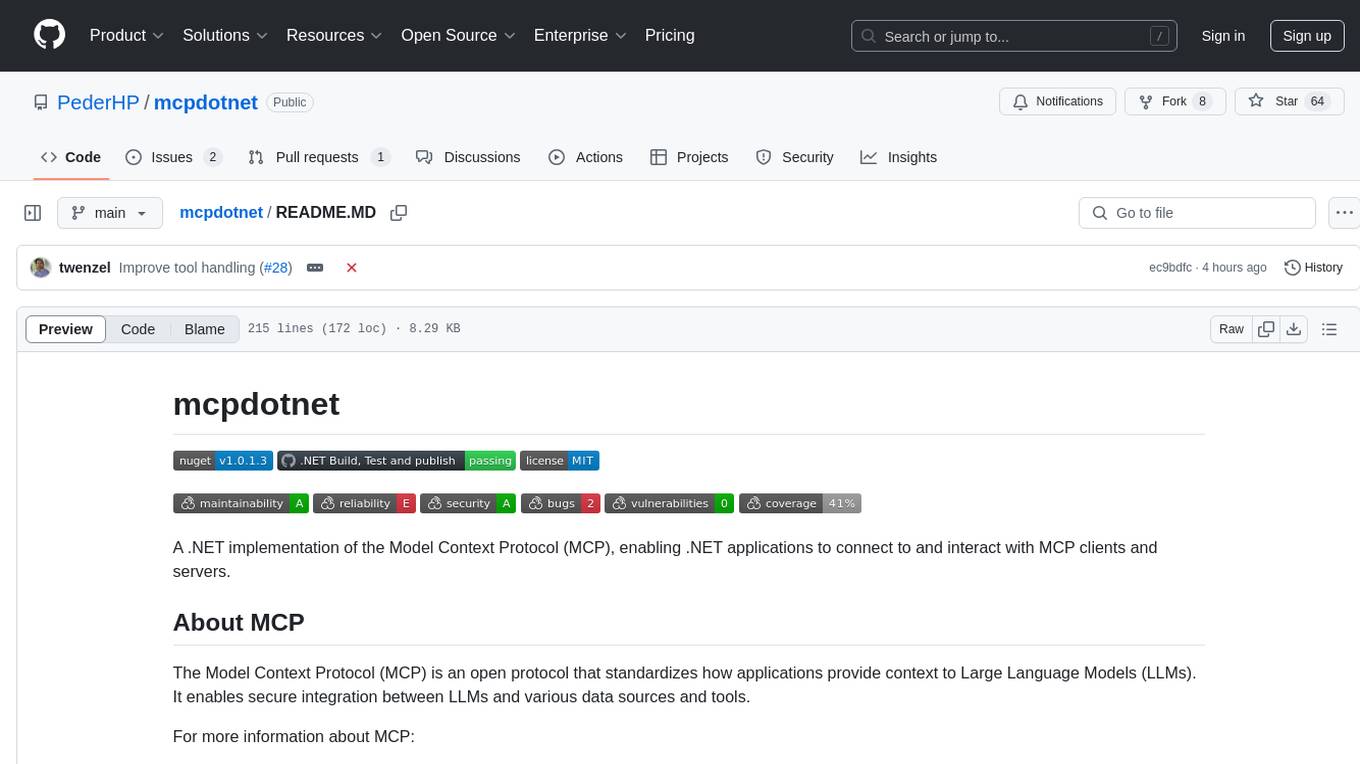
mcpdotnet
mcpdotnet is a .NET implementation of the Model Context Protocol (MCP), facilitating connections and interactions between .NET applications and MCP clients and servers. It aims to provide a clean, specification-compliant implementation with support for various MCP capabilities and transport types. The library includes features such as async/await pattern, logging support, and compatibility with .NET 8.0 and later. Users can create clients to use tools from configured servers and also create servers to register tools and interact with clients. The project roadmap includes expanding documentation, increasing test coverage, adding samples, performance optimization, SSE server support, and authentication.
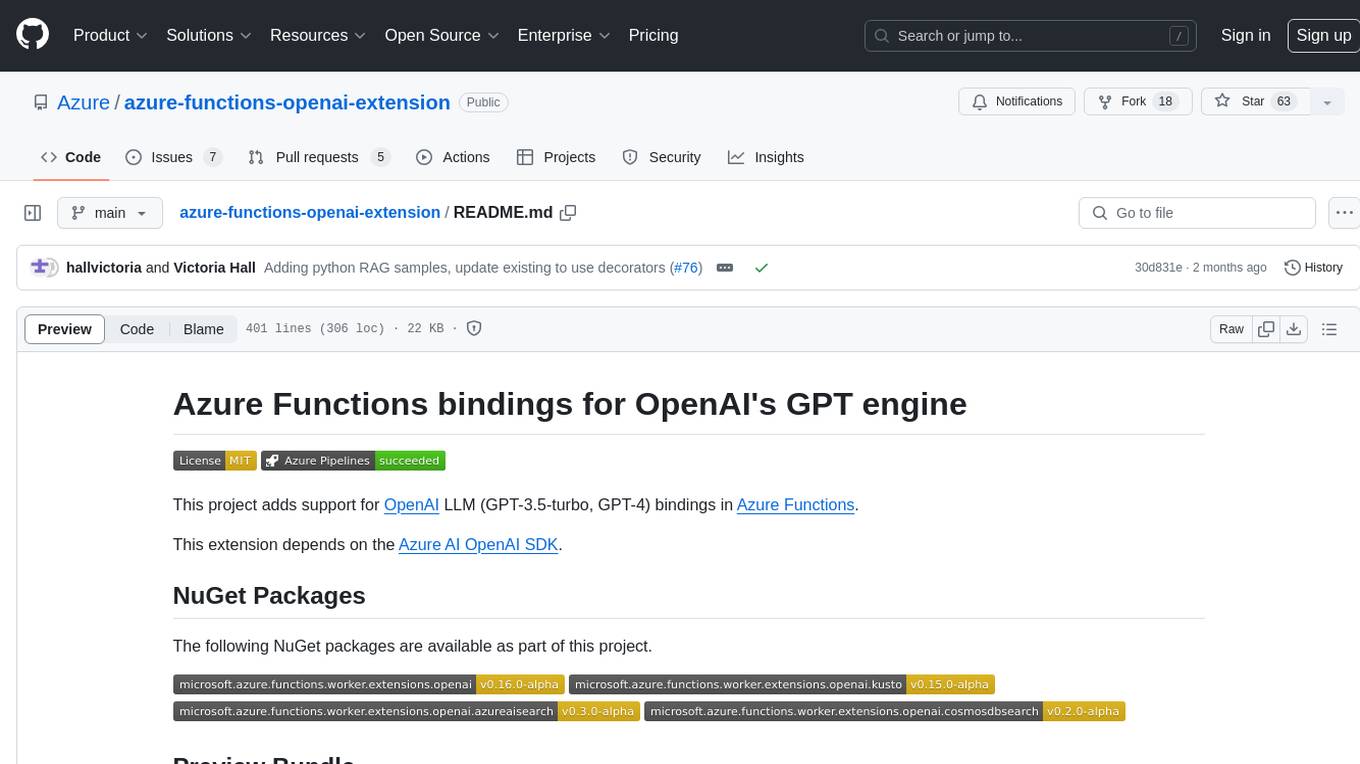
azure-functions-openai-extension
Azure Functions OpenAI Extension is a project that adds support for OpenAI LLM (GPT-3.5-turbo, GPT-4) bindings in Azure Functions. It provides NuGet packages for various functionalities like text completions, chat completions, assistants, embeddings generators, and semantic search. The project requires .NET 6 SDK or greater, Azure Functions Core Tools v4.x, and specific settings in Azure Function or local settings for development. It offers features like text completions, chat completion, assistants with custom skills, embeddings generators for text relatedness, and semantic search using vector databases. The project also includes examples in C# and Python for different functionalities.

KULLM
KULLM (구름) is a Korean Large Language Model developed by Korea University NLP & AI Lab and HIAI Research Institute. It is based on the upstage/SOLAR-10.7B-v1.0 model and has been fine-tuned for instruction. The model has been trained on 8×A100 GPUs and is capable of generating responses in Korean language. KULLM exhibits hallucination and repetition phenomena due to its decoding strategy. Users should be cautious as the model may produce inaccurate or harmful results. Performance may vary in benchmarks without a fixed system prompt.
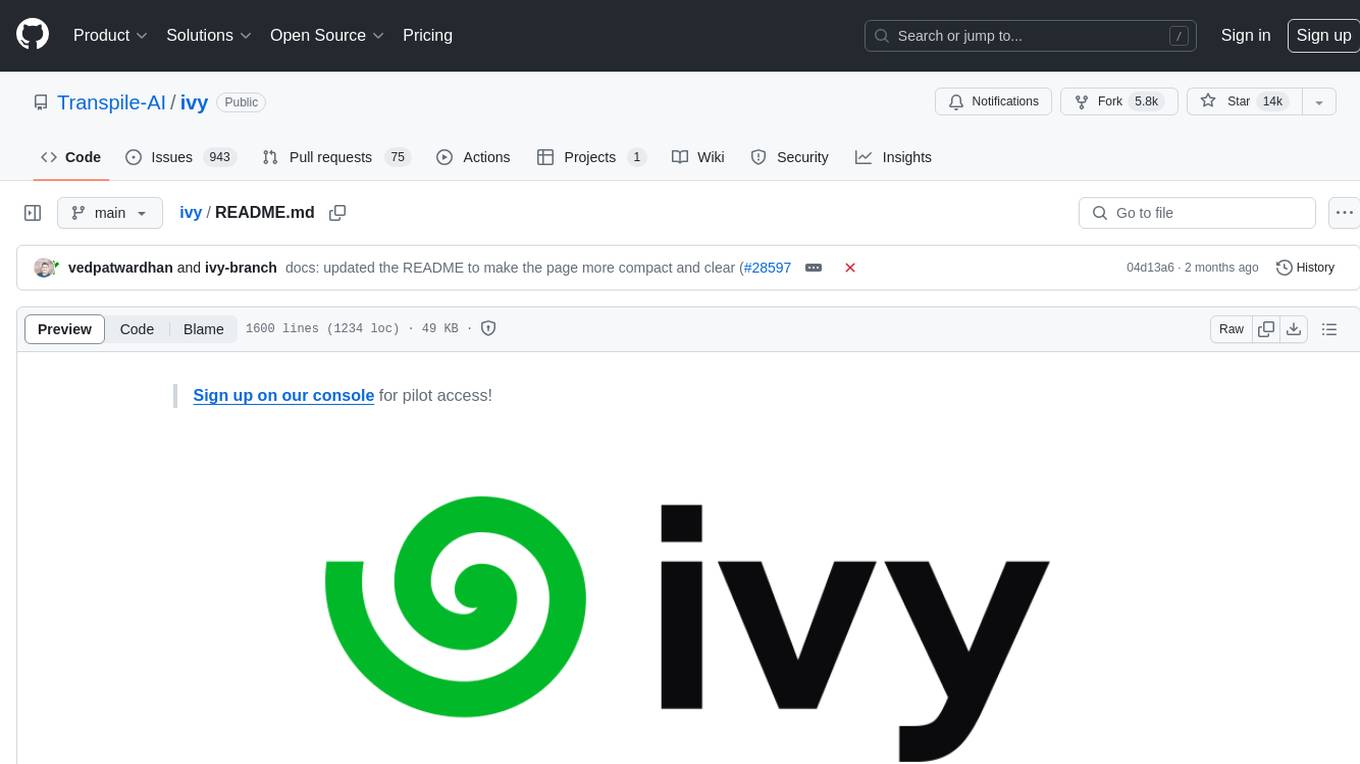
ivy
Ivy is an open-source machine learning framework that enables users to convert code between different ML frameworks and write framework-agnostic code. It allows users to transpile code from one framework to another, making it easy to use building blocks from different frameworks in a single project. Ivy also serves as a flexible framework that breaks free from framework limitations, allowing users to publish code that is interoperable with various frameworks and future frameworks. Users can define trainable modules and layers using Ivy's stateful API, making it easy to build and train models across different backends.
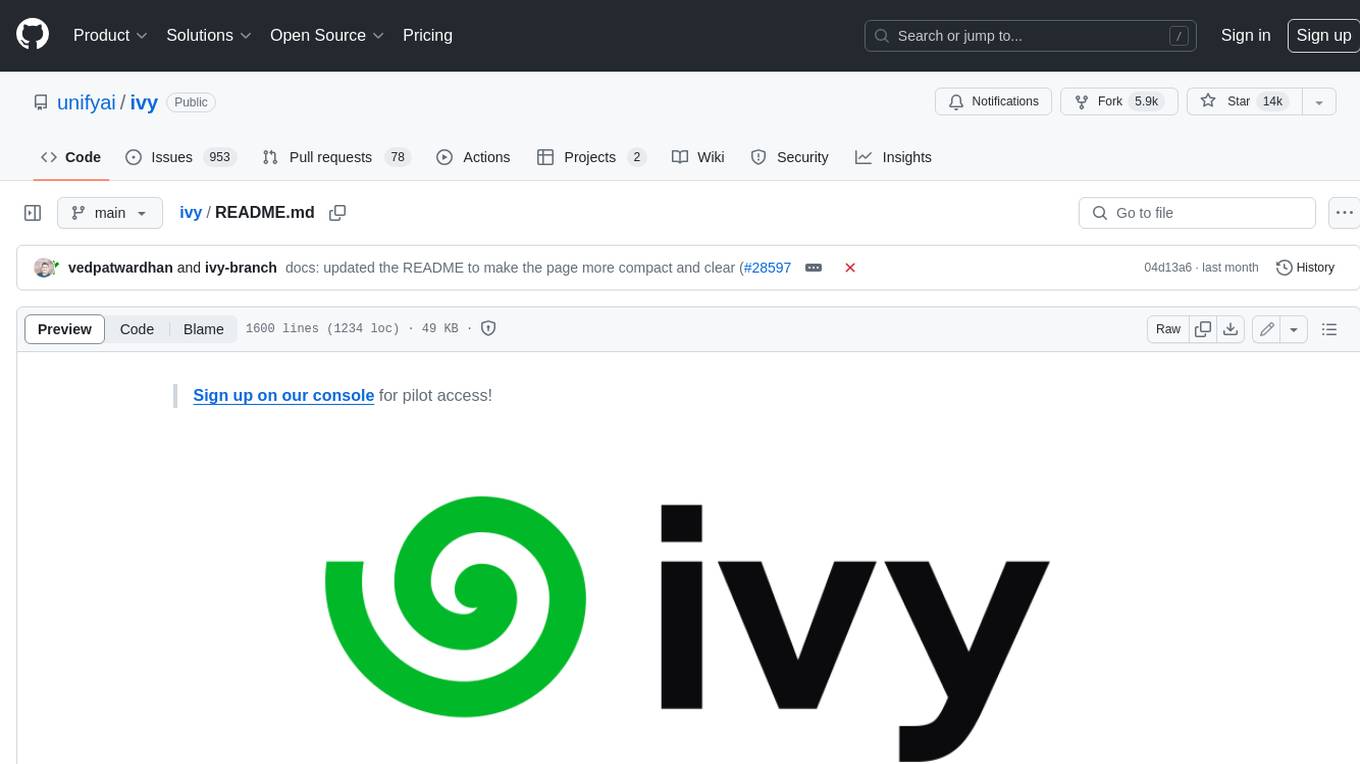
ivy
Ivy is an open-source machine learning framework that enables you to: * 🔄 **Convert code into any framework** : Use and build on top of any model, library, or device by converting any code from one framework to another using `ivy.transpile`. * ⚒️ **Write framework-agnostic code** : Write your code once in `ivy` and then choose the most appropriate ML framework as the backend to leverage all the benefits and tools. Join our growing community 🌍 to connect with people using Ivy. **Let's** unify.ai **together 🦾**
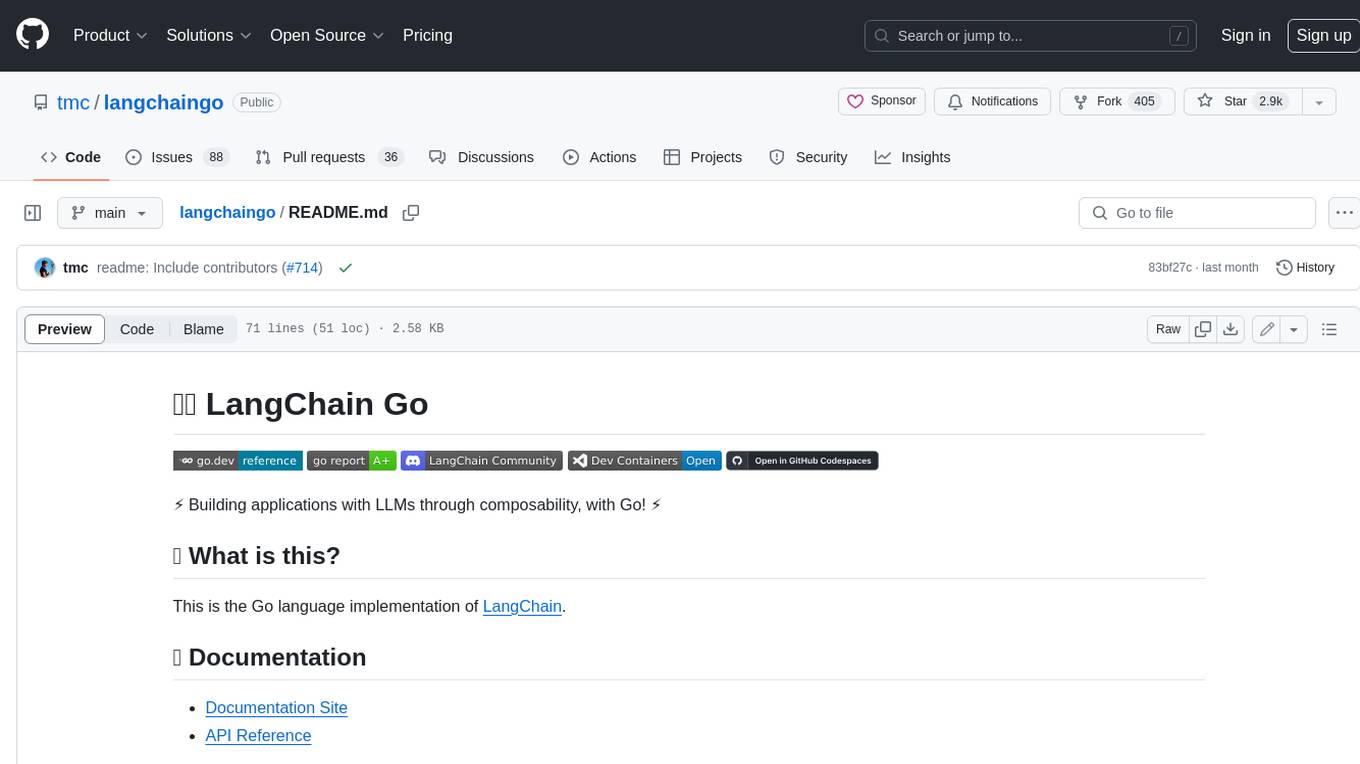
langchaingo
LangChain Go is a Go language implementation of LangChain, a framework for building applications with LLMs through composability. It provides a simple and easy-to-use API for interacting with LLMs, making it easy to add language-based features to your applications.
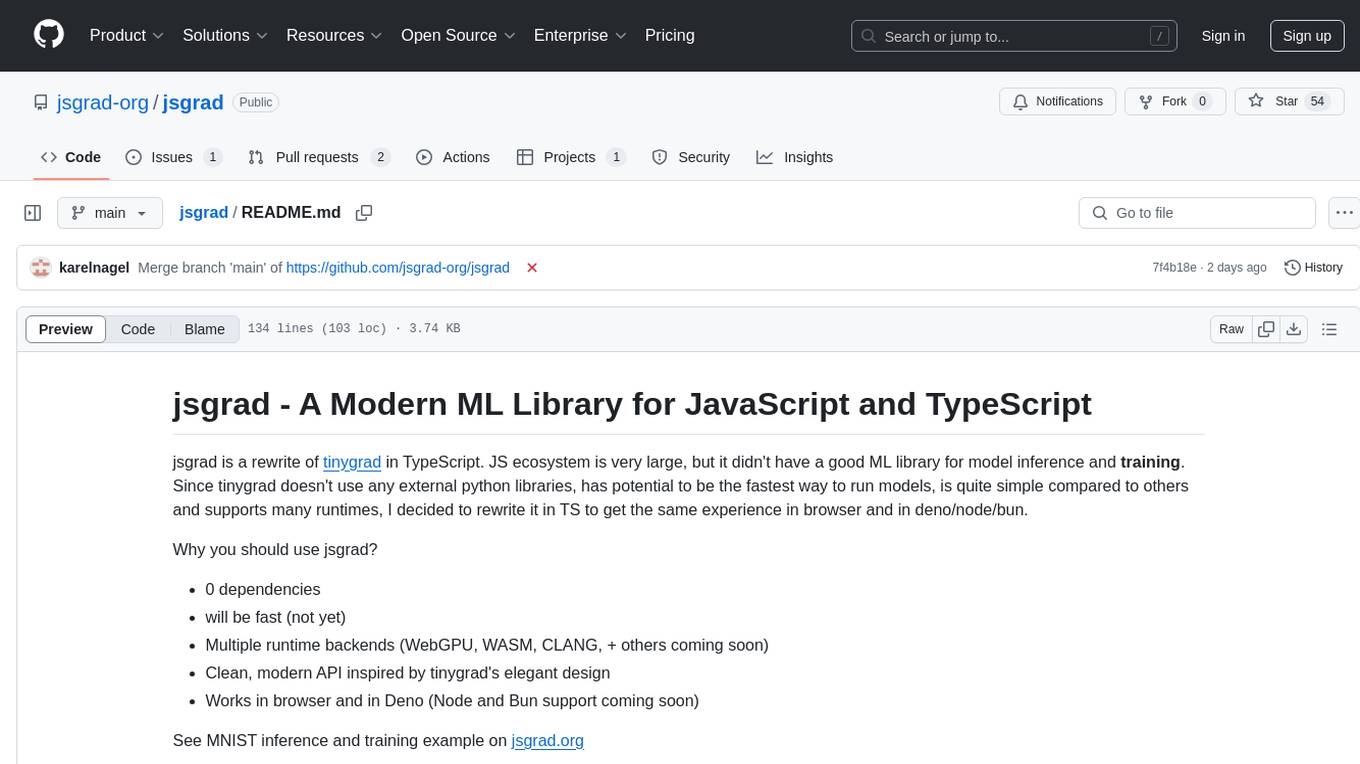
jsgrad
jsgrad is a modern ML library for JavaScript and TypeScript that aims to provide a fast and efficient way to run and train machine learning models. It is a rewrite of tinygrad in TypeScript, offering a clean and modern API with zero dependencies. The library supports multiple runtime backends such as WebGPU, WASM, and CLANG, making it versatile for various applications in browser and server environments. With a focus on simplicity and performance, jsgrad is designed to be easy to use for both model inference and training tasks.
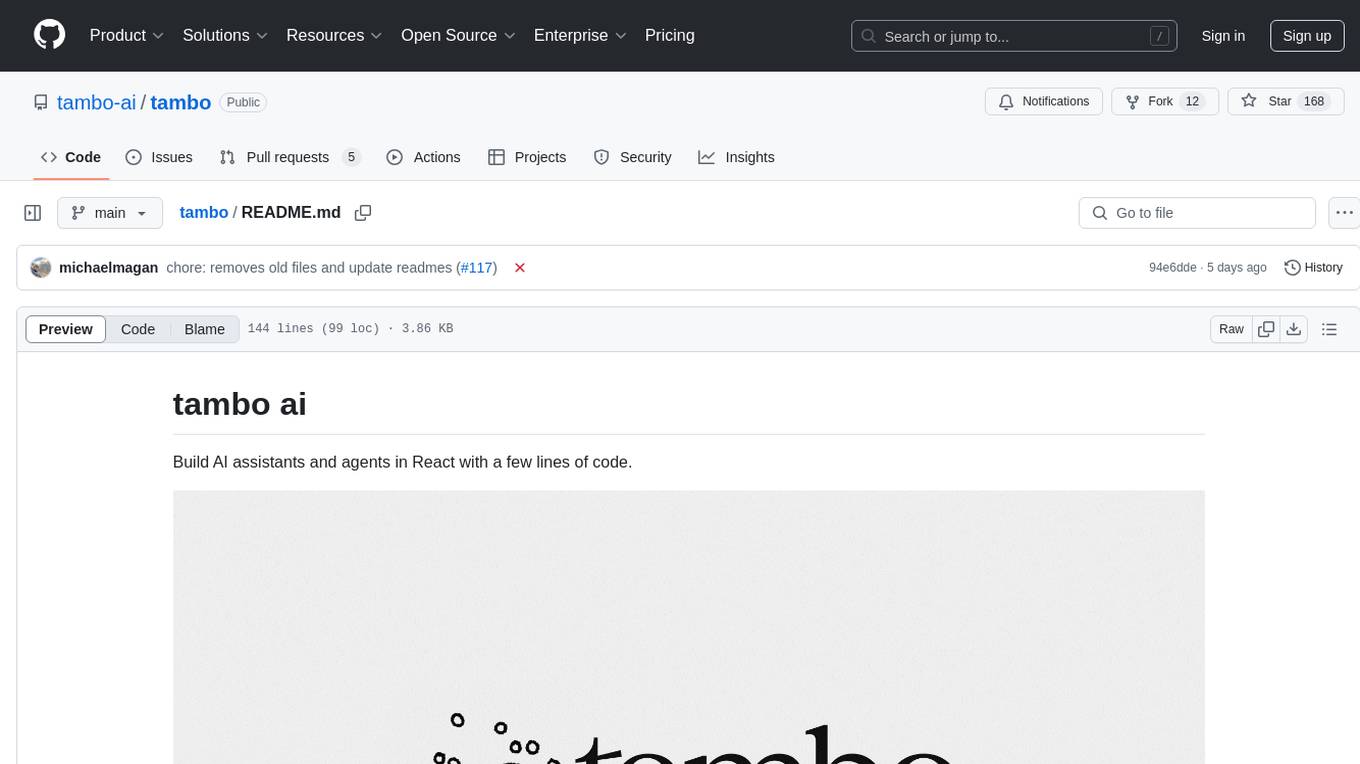
tambo
tambo ai is a React library that simplifies the process of building AI assistants and agents in React by handling thread management, state persistence, streaming responses, AI orchestration, and providing a compatible React UI library. It eliminates React boilerplate for AI features, allowing developers to focus on creating exceptional user experiences with clean React hooks that seamlessly integrate with their codebase.
For similar tasks

higlabo
HigLabo is a versatile C# library that provides various features such as an OpenAI client library, the fastest object mapper, a DAL generator, and support for functionalities like Mail, FTP, RSS, and Twitter. The library includes modules like HigLabo.OpenAI for chat completion and Groq support, HigLabo.Anthropic for Anthropic Claude AI, HigLabo.Mapper for object mapping, DbSharp for stored procedure calls, HigLabo.Mime for MIME parsing, HigLabo.Mail for SMTP, POP3, and IMAP functionalities, and other utility modules like HigLabo.Data, HigLabo.Converter, and HigLabo.Net.Slack. HigLabo is designed to be easy to use and highly customizable, offering performance optimizations for tasks like object mapping and database access.
For similar jobs

sweep
Sweep is an AI junior developer that turns bugs and feature requests into code changes. It automatically handles developer experience improvements like adding type hints and improving test coverage.

teams-ai
The Teams AI Library is a software development kit (SDK) that helps developers create bots that can interact with Teams and Microsoft 365 applications. It is built on top of the Bot Framework SDK and simplifies the process of developing bots that interact with Teams' artificial intelligence capabilities. The SDK is available for JavaScript/TypeScript, .NET, and Python.

ai-guide
This guide is dedicated to Large Language Models (LLMs) that you can run on your home computer. It assumes your PC is a lower-end, non-gaming setup.

classifai
Supercharge WordPress Content Workflows and Engagement with Artificial Intelligence. Tap into leading cloud-based services like OpenAI, Microsoft Azure AI, Google Gemini and IBM Watson to augment your WordPress-powered websites. Publish content faster while improving SEO performance and increasing audience engagement. ClassifAI integrates Artificial Intelligence and Machine Learning technologies to lighten your workload and eliminate tedious tasks, giving you more time to create original content that matters.

chatbot-ui
Chatbot UI is an open-source AI chat app that allows users to create and deploy their own AI chatbots. It is easy to use and can be customized to fit any need. Chatbot UI is perfect for businesses, developers, and anyone who wants to create a chatbot.

BricksLLM
BricksLLM is a cloud native AI gateway written in Go. Currently, it provides native support for OpenAI, Anthropic, Azure OpenAI and vLLM. BricksLLM aims to provide enterprise level infrastructure that can power any LLM production use cases. Here are some use cases for BricksLLM: * Set LLM usage limits for users on different pricing tiers * Track LLM usage on a per user and per organization basis * Block or redact requests containing PIIs * Improve LLM reliability with failovers, retries and caching * Distribute API keys with rate limits and cost limits for internal development/production use cases * Distribute API keys with rate limits and cost limits for students

uAgents
uAgents is a Python library developed by Fetch.ai that allows for the creation of autonomous AI agents. These agents can perform various tasks on a schedule or take action on various events. uAgents are easy to create and manage, and they are connected to a fast-growing network of other uAgents. They are also secure, with cryptographically secured messages and wallets.

griptape
Griptape is a modular Python framework for building AI-powered applications that securely connect to your enterprise data and APIs. It offers developers the ability to maintain control and flexibility at every step. Griptape's core components include Structures (Agents, Pipelines, and Workflows), Tasks, Tools, Memory (Conversation Memory, Task Memory, and Meta Memory), Drivers (Prompt and Embedding Drivers, Vector Store Drivers, Image Generation Drivers, Image Query Drivers, SQL Drivers, Web Scraper Drivers, and Conversation Memory Drivers), Engines (Query Engines, Extraction Engines, Summary Engines, Image Generation Engines, and Image Query Engines), and additional components (Rulesets, Loaders, Artifacts, Chunkers, and Tokenizers). Griptape enables developers to create AI-powered applications with ease and efficiency.